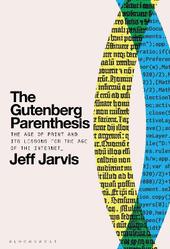
|
The Gutenberg Parenthesis: The Age of Print and Its Lessons for the Age of the Internet
Hardback
Main Details
| Title |
The Gutenberg Parenthesis: The Age of Print and Its Lessons for the Age of the Internet
|
| Authors and Contributors |
By (author) Prof Jeff Jarvis
|
| Physical Properties |
| Format:Hardback | | Pages:288 | | Dimensions(mm): Height 229,Width 152 |
|
| Category/Genre | Literary theory |
|---|
| ISBN/Barcode |
9781501394829
|
| Classifications | Dewey:686.209 |
|---|
| Audience | |
|---|
|
Publishing Details |
| Publisher |
Bloomsbury Publishing Plc
|
| Imprint |
Bloomsbury Academic USA
|
| NZ Release Date |
24 August 2023 |
| Publication Country |
United States
|
Description
The five-century-long age of print was a grand exception in history. It gave rise to a worldview that some call print culture - shaped according to the completeness, permanence, materiality, authorship, and authority of the printed word. As print and its influence on every aspect of life is now being eclipsed by new technologies - the internet and data - the contrast between these eras gives us the opportunity to better recognize how print has shaped us. To help us understand our transition out of the Gutenberg Age, Jeff Jarvis examines the transition into it. This includes the history of print, its invention and spread; innovations with print, including the novel, the essay, and the newspaper; and the impact of print, leading to the growth of bureaucracy, censorship, and nations. What can we learn from the captivating, profound, and challenging history of our devotion to print? Could it be that we are returning to a time before mass media, to a society built on conversation, and that we are relearning how to hold that conversation with ourselves? The Gutenberg Parenthesis examines print's age on a grand scale and challenges readers to absorb its lessons as we design the internet and society of our future.
Author Biography
Jeff Jarvis is Leonard Tow Professor of Journalism Innovation and Director of the Tow-Knight Center for Entrepreneurial Journalism at the Craig Newmark Graduate School of Journalism at the City University of New York, USA, where he created new degrees in Social Journalism, Entrepreneurial Journalism, and News Innovation. He is the Creator and Founding Manager Editor of Entertainment Weekly and has been a media columnist at The Guardian, TV Critic and Development Editor at TV Guide, Associate Publisher and Sunday Editor at the New York Daily News, TV Critic and Associate Editor at People, and columnist and editor at the San Francisco Examiner and the Chicago Tribune. He is the author of four books, including, including Geeks Bearing Gifts: Imagining New Futures for News (2014), Public Parts: How Sharing in the Digital Age Improves the Way We Work and Live (2011), and What Would Google Do? (2009).
ReviewsJeff Jarvis is the ideal guide for this fast-paced history of communication. Shrewd, witty and always generous to his fellow authors, this book is crammed with pointed observation and profound reflection on the present and future of information culture. As print transitions to the digital age, Jarvis explores the potentialities and potentialities of unbridled access to information as a realist who sees a path to sanity as our media turbulence finds a new normal. * Andrew Pettegree, Wardlaw Professor of History, University of St. Andrews, UK * Jeff Jarvis magisterially charts how the invention of printing shifted power from individuals and communities to experts and the undifferentiated 'masses,' and then brilliantly shows how the internet is reversing this half-millenium shift. Information in print became a controlled commodity with enforced scarcity, that reinforced language and institutional borders and power. Initially extending the reach of thought, printing shaped that thought; the medium became the message, on steroids. Digital now makes possible and even insists upon richer, less controlled exchange of ideas, including fakes. What we need, Jarvis makes clear, is not censorship of our chaotic global conversation but clear goals, guardrails, and institutions to ensure inclusion, accuracy, and privacy. We are all facing this together, and are now all on notice to take up Jarvis's challenge. * Anthony Marx, President and CEO, New York Public Library * Jeff Jarvis's The Gutenberg Parenthesis invites disenchanted media users to scour the history of print for lessons that may help us build a better future for media. No one has thought as nimbly as Jarvis about how communications shape societies, and his polemic gives hope for these disenchanted times. * Leah Price, Henry Rutgers Distinguished Professor of English, Rutgers University, USA *
|